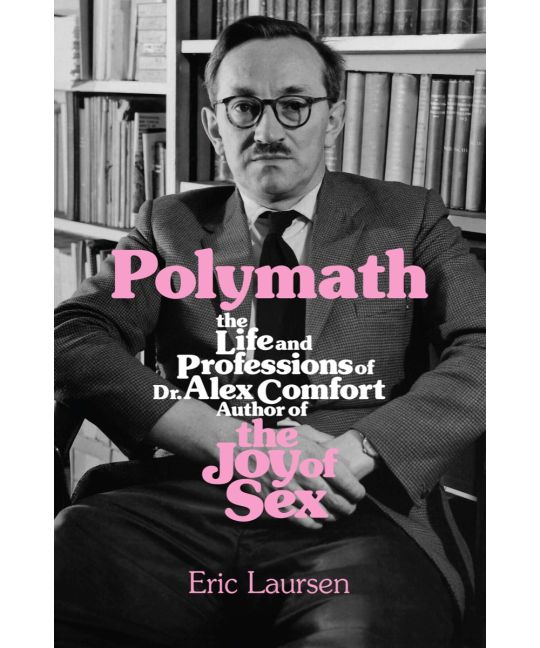The Life and Professions of Dr. Alex Comfort, Author of The Joy of Sex
Eric Laursen
AK Press ($34)
As an independent scholar, Eric Laursen spent many years working on Polymath, a thick biography of the protean Alex Comfort (1920–2000), who became famous for his 1972 smash hit The Joy of Sex, an illustrated manual that sold millions of copies worldwide. But before this unexpected bout with celebrity, Comfort was a widely published poet, a novelist, a certified physician, a contributor to anarchist publications in both England and America, a research biologist, a pioneering influence on gerontology (the study of aging), a literary critic, a prolific book reviewer, and a popular BBC broadcaster, even though he spoke much faster than the typical on-air personality. (Bits of his fast-speaking for the Beeb can be heard on YouTube.)
Comfort was also a pacifist whom George Orwell famously dismissed as a Nazi dupe during World War II; their disagreement on the necessity of war was the subject of a 2018 book by Laursen, The Duty to Stand Aside. Courageously inventive as an activist, however, Comfort developed a precursor to pirate radio during the Suez Crisis of 1956. As Laursen tells it, “Working almost entirely in secret, with no collaborators, he broadcast a nightly radio message calling on listeners to protest the invasion and demand that Britain unilaterally scarp its nuclear arsenal.”
Essentially, Comfort was a respected public intellectual, moderately influential in a variety of fields, until he and a sympathetic publisher produced The Joy of Sex—“produced” because so slight was his input that the cover of the initial 1972 edition has it “edited by” him with his degrees of “M.B. and Ph. D.,” as though it were a medical book. Only later did Comfort claim authorial credit, which was given, though the reader can be grateful that the subtitle “A Gourmet Guide to Lovemaking” replaced the one in Comfort’s original draft: “Cordon Bleu Lovemaking.”
Joy has three themes, two classic and the other fashionable. The first, reflecting Comfort’s libertarian anarchism, holds that no one has more authority than anyone else to tell you how to do sexual relations. The second, denying religious and other proscriptions, expands this legendary sentence: “Chastity is no more of a virtue than malnutrition.” The third, reflecting its era, opines that sex should be fun, even if “love” doesn’t accompany it. No previous book on the subject so successfully disseminated these themes.
To support his title of Polymath, Laursen intelligently surveys Comfort’s literary and scientific work that appeared in a few dozen books. As a critic, Laursen regards I and That: Notes on the Biology of Religion (Crown, 1979) as Comfort’s very best book. (Out of print, it can be hard to find in used bookstores and libraries, though scans of the complete text can be found on the internet.) Laursen also takes seriously Comfort’s poetry, though it had more presence in 1940s England than anywhere else or since.
For students of publishing, Polymath is useful for chronicling the calculation and career of a bestseller. Conversely, it documents the obstacles that Comfort encountered in publishing his other books, which, before and even after the success of Joy, appeared primarily from small literary presses, mostly now forgotten, and from specialized scientific outlets.
Comfort moved to Southern California in the wake of Joy, becoming a nouveau American millionaire celebrity. Whereas English media sought his advice on several subjects, here he was asked only about sex, to his annoyance. In Gay Talese’s 1981 book on sexuality in America, Thy Neighbor’s Wife, Comfort is memorably portrayed as an overage visitor to swingers’ clubs; other commentators have described his schemes to minimize his personal income taxes. Uncomfortable in the U.S., Comfort moved with his second wife back to England, where he suffered the first of several debilitating strokes at seventy-one and died just after his eightieth birthday (it remains unfortunate that he didn’t get to test his gerontology ideas against his own eighties and nineties). Though he influenced many people in many ways, he did not have protégés; his sole heir and executor was his only son, the journalist Nicholas Comfort. But undoubtedly Alex Comfort led a unique and protean life that Laursen tells well in this nearly 800-page book—it is doubtful that anyone else will ever tell it better.
What some may find odd about Polymath is the absence of any acknowledgment of Comfort’s American analogue, the writer Paul Goodman (1911–1972), who resembled Comfort in many ways. Both were anarchists for life; both were published by Dwight Macdonald in his magazine Politics in the 1940s. Whereas Comfort worked in medicine, Goodman was an unlicensed psychotherapist who co-authored the substantial 1951 text Gestalt Therapy. Just as both published poetry and fiction as well as nonfiction, so both had many publishers, because their work was essentially noncommercial and their interests nonpredictable. Until Goodman published his popular Growing Up Absurd (Random House, 1960), likewise around the age of fifty, his books were little known, but after Absurd went into a second printing, Random House released books of Goodman’s poems, lectures, and much else (until he was dumped). They probably never met as Goodman was too indigent to travel to Europe, while Comfort didn’t often come to the U.S. until the mid-1970s. One radical move for a future writer would be a double consideration of Comfort and Goodman, literally parallel lives; the experience of one libertarian life would surely illuminate the other, even though they never collaborated.
Click below to purchase this book through Bookshop and support your local independent bookstore:
Rain Taxi Online Edition Spring 2024 | © Rain Taxi, Inc. 2024

